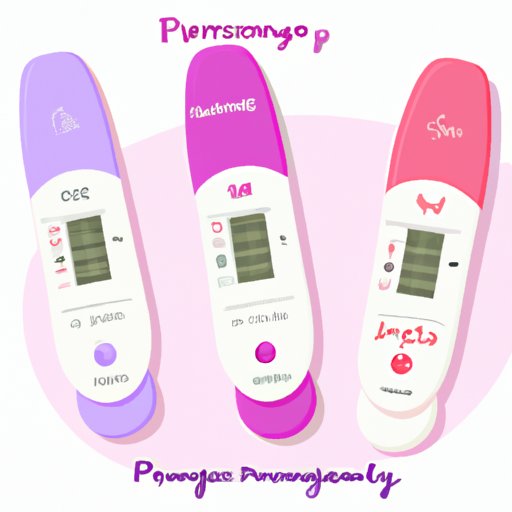
Introduction
Whether you’re actively trying to conceive or just suspect you may be pregnant, it’s important to know the signs of pregnancy. Understanding the symptoms can help you feel more informed and prepared for the journey ahead. In this article, we’ll cover everything from the earliest signs of pregnancy to the symptoms you can expect during each trimester.
7 Surefire Signs You’re Expecting: How to Know if You’re Pregnant
There are several primary symptoms that indicate pregnancy:
- Breast tenderness and swelling
- Spotting or cramping
- Missed period
- Frequent urination
- Nausea and vomiting (morning sickness)
- Increased fatigue
- Food aversions or cravings
If you’re experiencing any of these symptoms, it’s important to track them carefully to confirm pregnancy. Keep a record of the date your period was due, as well as any other symptoms you’re experiencing. You can also take an at-home pregnancy test or schedule an appointment with your healthcare provider to determine if you’re pregnant.
Am I Expecting? The Top 5 Early Indicators of Pregnancy
While some pregnancy symptoms may not appear until a woman has missed her period, there are several early indicators of pregnancy that women should be aware of. These include:
- Mood swings and irritability
- Increased fatigue
- Spotting or light bleeding
- Nausea and vomiting (morning sickness)
- Changes in appetite or food cravings
These symptoms can be caused by fluctuations in hormonal levels as the body prepares for implantation and pregnancy. It’s important to manage these symptoms by getting plenty of rest, staying hydrated, and following a healthy diet.
Can You Tell if You’re Pregnant Before a Missed Period? Yes, Here’s How
In some cases, women may be able to tell they’re pregnant before their menstrual cycle is missed. Additional symptoms that can indicate early pregnancy include:
- Implantation bleeding or spotting
- Increase in basal body temperature
- Changes to the cervix, including increased blood flow
- Increased vaginal discharge
- Bloating and cramping
It’s important to track these symptoms carefully to determine if you’re pregnant. However, it’s important to note that these symptoms can also be caused by other factors and may not necessarily indicate pregnancy.
30 Pregnancy Symptoms You Need to Know About
Throughout each trimester of pregnancy, women can experience a wide range of symptoms. Here are just a few examples:
First Trimester
- Morning sickness
- Breast tenderness and swelling
- Frequent urination
- Fatigue and exhaustion
- Mood swings
- Food aversions or cravings
Second Trimester
- Heartburn and indigestion
- Stretch marks
- Back pain
- Nasal congestion and bleeding
- Braxton Hicks contractions
Third Trimester
- Swollen ankles and feet
- Shortness of breath
- Insomnia
- Increased fatigue
- Contractions and labor
It’s important to remember that every pregnancy is unique and some women may not experience all of these symptoms. If you have concerns about any symptoms you’re experiencing, it’s always best to talk to your healthcare provider.
Pregnancy Testing 101: How to Confirm You’re Expecting
One of the easiest ways to confirm pregnancy is through an at-home pregnancy test. These tests detect the presence of the hormone human chorionic gonadotropin (hCG), which is produced by the placenta shortly after implantation. There are several types of pregnancy tests available, including:
- Strip tests
- Digital tests
- Midstream tests
It’s important to follow the instructions carefully when taking an at-home pregnancy test to ensure accurate results. If you’re unsure whether you’re reading the test correctly or the test is negative but you still suspect you’re pregnant, it’s always best to consult with your healthcare provider.
Expecting or Not? Understanding the Accuracy of Home Pregnancy Tests
While at-home pregnancy tests are generally accurate, there are several factors that can affect the results. Some of these include:
- The sensitivity of the test
- The timing of the test
- Test errors, such as using the wrong amount of urine or reading the test too early or too late
If you take an at-home pregnancy test and receive a positive result, it’s important to make an appointment with your healthcare provider to confirm the pregnancy and receive prenatal care.
The First Trimester: Coping with Common Early Pregnancy Symptoms
The first trimester is often the most challenging for many women, as the body adapts to a wide range of hormonal and physical changes. Some tips for managing common early pregnancy symptoms include:
- Get plenty of rest
- Stay hydrated
- Eat frequent, small meals to manage nausea
- Avoid foods that trigger nausea and vomiting
- Take prenatal vitamins as recommended by your healthcare provider
It’s important to remember that each woman’s experience of pregnancy is unique, and there’s no ‘right’ way to feel throughout the journey. Whether you’re experiencing challenging symptoms or enjoying a relatively easy pregnancy, it’s always important to prioritize self-care and seek support from loved ones and healthcare providers.
Conclusion
Pregnancy can be a challenging and overwhelming experience, but it’s also a time of great joy and anticipation. Knowing the signs and symptoms of pregnancy can help you feel more informed and prepared, and there are many resources available to support you throughout your journey. By following healthy lifestyle habits, seeking support when you need it, and listening to your body, you can experience a happy, healthy pregnancy.




